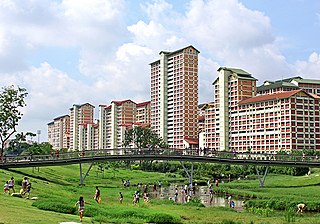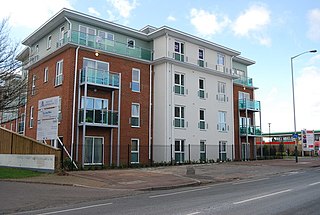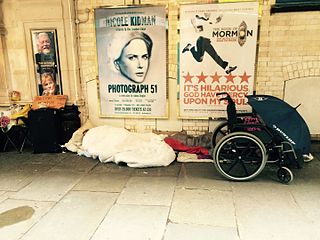A quango or QUANGO is an organisation to which a government has devolved power, but which is still partly controlled and/or financed by government bodies. The term was originally a shortening of "quasi NGO", where NGO is the acronym for a non-government organization.
A unitary authority is a local authority responsible for all local government functions within its area or performing additional functions that elsewhere are usually performed by a higher level of sub-national government or the national government.

Public housing is a form of housing tenure in which the property is usually owned by a government authority, either central or local. Although the common goal of public housing is to provide affordable housing, the details, terminology, definitions of poverty, and other criteria for allocation vary within different contexts. Within the OECD, social housing represents an average of 7% of national housing stock (2020), ranging from ~34% in the Netherlands to less than 1% in Colombia.

In the United Kingdom, a listed building is a structure of particular architectural and/or historic interest deserving of special protection. Such buildings are placed on one of the four statutory lists maintained by Historic England in England, Historic Environment Scotland in Scotland, Cadw in Wales, and the Northern Ireland Environment Agency in Northern Ireland. The classification schemes differ between England and Wales, Scotland, and Northern Ireland. The term has also been used in the Republic of Ireland, where buildings are protected under the Planning and Development Act 2000, although the statutory term in Ireland is "protected structure."

In Ireland and the United Kingdom, housing associations are private, non-profit making organisations that provide low-cost "social housing" for people in need of a home. Any budget surplus is used to maintain existing housing and to help finance new homes and it cannot be used for personal benefit of directors or shareholders. Although independent, they are regulated by the state and commonly receive public funding. They are now the United Kingdom's major providers of new housing for rent, while many also run shared ownership schemes to help those who cannot afford to buy a home outright.

The Department for Environment, Food and Rural Affairs (Defra) is a ministerial department of the Government of the United Kingdom. It is responsible for environmental protection, food production and standards, agriculture, fisheries and rural communities in the entire United Kingdom. Concordats set out agreed frameworks for co operation, between it and the Scottish Government, Welsh Government and Northern Ireland Executive, which have devolved responsibilities for these matters in their respective nations.

Thames Gateway is a term applied to an area around the Thames Estuary in the context of discourse around regeneration and further urbanisation. The term was first coined by the UK government and applies to an area of land stretching 70 kilometres (43 mi) east from inner east and south-east London on both sides of the River Thames and the Thames Estuary. It stretches from Westferry in Tower Hamlets to the Isle of Sheppey/Southend-on-Sea and extends across three ceremonial counties.

The Department for Transport (DfT) is a ministerial department of the Government of the United Kingdom. It is responsible for the English transport network and a limited number of transport matters in Scotland, Wales, and Northern Ireland that have not been devolved. The department is run by the Secretary of State for Transport, currently, Mark Harper.
Ministry or department are designations used by first-level executive bodies in the machinery of governments that manage a specific sector of public administration.

The Department for Levelling Up, Housing and Communities is a ministerial department of the Government of the United Kingdom. It is responsible for housing, communities, and local government in England and the levelling up policy. It was established in May 2006 and is the successor to the Office of the Deputy Prime Minister, established in 2001. The department shares its headquarters building, at 2 Marsham Street in London, with the Home Office. It was renamed to add Housing to its title, changed to a ministry in January 2018, and later reverted to a government department in the 2021 reshuffle.
The Department for Communities is a devolved Northern Ireland government department in the Northern Ireland Executive. The minister with overall responsibility for the department is the Minister for Communities. The department was previously created in May 2016 following the Fresh Start Agreement and the dissolution of several departments, such as the Department for Social Development, the Department of the Environment, the Department of Culture, Arts and Leisure and the Department for Employment and Learning from which several functions have amalgamated.

The Housing Act of 1937, formally the "United States Housing Act of 1937" and sometimes called the Wagner–Steagall Act, provided for subsidies to be paid from the United States federal government to local public housing agencies (LHAs) to improve living conditions for low-income families.

The Ministry of National Development is a ministry of the Government of Singapore responsible for the formulation and implementation of policies related to the land-use planning and infrastructure development in Singapore.

Homelessness in the United Kingdom is measured and responded to in differing ways in England, Scotland, Wales and Northern Ireland, but affects people living in every part of the UK's constituent countries. Most homeless people have at least a modicum of shelter but without any security of tenure. Unsheltered people, "rough sleepers", are a small minority of homeless people.
Following the 2010 United Kingdom general election, the UK Government under the Cameron–Clegg coalition announced plans to curb public spending through the abolition of a large number of quasi-autonomous non-governmental organisations (quangos). This was styled in the national press as a "bonfire of the quangos", making reference to Girolamo Savonarola's religiously inspired Bonfire of the Vanities.
The Housing Authority of the City of Milwaukee (HACM) is a municipal agency of Milwaukee, Wisconsin dedicated to providing public housing and services for residents of the city of Milwaukee. The agency was established in 1944 and is responsible to a board of commissioners appointed by the mayor.

The Ministry of Business, Innovation and Employment is the public service department of New Zealand charged with "delivering policy, services, advice and regulation" which contribute to New Zealand's economic productivity and business growth.

Affordable housing is housing that is deemed affordable to those with a median household income as rated by the national government or a local government by a recognized housing affordability index. A general rule is no more than 30% of gross monthly income should be spent on housing, to be considered affordable as the challenges of promoting affordable housing varies by location.












